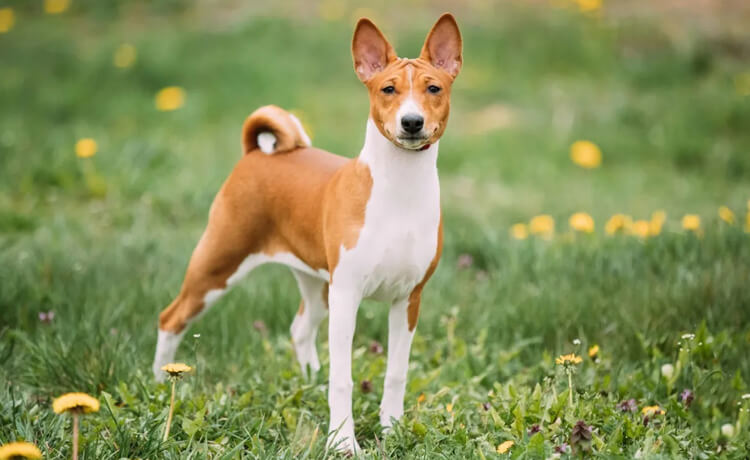
Basenji
The Basenji, often referred to as the “barkless dog,” is a small to medium-sized breed known for its unique vocalization, intelligence, and cat-like grooming habits. Originating from Central Africa, this breed is cherished for its independence, agility, and distinctive traits that set it apart from other dogs. Despite its size, the Basenji is a highly capable and energetic companion, making it ideal for active owners who appreciate a dog with a strong personality.
Appearance:
The Basenji is a compact and elegant dog with a short, fine coat that comes in various colors, including red, black, tricolor, and brindle, often with white markings on the chest, paws, and tail tip. It typically weighs between 22 to 24 pounds and stands around 16 to 17 inches tall at the shoulder.
One of the most striking features of the Basenji is its tightly curled tail and large, upright ears that contribute to its alert expression. The breed has a graceful, square build and a wrinkled forehead that gives it a look of curiosity and intelligence.
Temperament:
Essentials for Your Newly Adopted Pet
Welcoming a shelter pet into your life is a beautiful journey. Here are some handpicked items to help your new friend feel safe, loved, and right at home:
The Basenji is known for its independent and inquisitive nature. It forms strong bonds with its family but may be aloof with strangers. This breed is highly intelligent but can be stubborn, making training a challenge if not approached with patience and positive reinforcement. The Basenji is also known for being playful, energetic, and good with older children who understand how to interact respectfully with dogs.
Despite its loyalty and affectionate nature with its family, the Basenji often displays a strong prey drive and should be socialized early to get along with other pets. The breed's cat-like grooming habits make it one of the cleanest dog breeds, as it frequently cleans itself much like a feline.
Intelligence & Trainability:
The Basenji is an intelligent breed, but its strong-willed nature can make training difficult for inexperienced dog owners. This breed requires consistent, positive training methods and early socialization to prevent behavioral problems. The Basenji is quick to learn commands and tasks when motivated but will quickly lose interest if training becomes repetitive or lacks rewards.
Due to its high energy levels, the Basenji needs plenty of mental and physical stimulation. Puzzle toys, agility courses, and interactive games can help keep this breed engaged.
Exercise Needs:
As an active and high-energy breed, the Basenji requires regular daily exercise to stay happy and healthy. Long walks, play sessions, and opportunities to run in a securely fenced yard are ideal for this breed. Without sufficient activity, the Basenji may become bored and engage in destructive behavior.
Health:
The Basenji is generally a healthy breed with a lifespan of 12 to 14 years. However, it is prone to certain health conditions, including:
- Fanconi Syndrome: A kidney disorder that can be genetic.
- Progressive Retinal Atrophy (PRA): An eye condition that can lead to blindness.
- Hip Dysplasia: Though not as common as in larger breeds, it can occur.
- Hypothyroidism: A condition that affects the thyroid gland.
Routine check-ups, a balanced diet, and regular exercise are essential to maintaining the health of a Basenji.
History and Origin:
The Basenji has a rich history tracing back thousands of years to ancient Egypt, where depictions of dogs resembling the Basenji appear in tombs and artwork. This breed was later discovered in the Congo, where it was used by local tribes for hunting due to its keen sense of sight and smell and its impressive agility. European explorers in the 19th century brought the Basenji to Europe, and it was later introduced to the United States in the 20th century.
The breed's reputation as a "barkless dog" comes from its unique vocalizations. While the Basenji doesn't bark like other dogs, it produces a yodel-like sound known as a "barroo," caused by the shape of its larynx.
Ideal Home:
The Basenji is best suited for an active home with owners who can provide consistent training, mental stimulation, and plenty of exercise. Due to its independent nature, this breed does well with experienced dog owners who understand how to handle its unique characteristics. The Basenji is not an ideal match for homes with small pets due to its prey drive unless socialized from a young age.
Fun Facts:
- The Basenji is known as the "barkless dog" but can communicate through unique yodels.
- It is an excellent escape artist and can jump high fences, so a secure yard is a must.
- The breed has an unusually low odor compared to other dogs and rarely sheds heavily.
Conclusion:
The Basenji is a breed like no other, with its unique vocalization, clean habits, and independent nature. While it requires an experienced hand for training and plenty of daily exercise, the Basenji rewards its owners with loyalty, affection, and endless entertainment. This breed is perfect for those who appreciate a dog that thinks for itself and enjoys an active lifestyle.
Affiliate Products
Up to 75% Discount

Dog Collar with Health Monitoring
BUY NOW »
Up to 55% Discount

Luxury Faux Furhuge Napping Bed
BUY NOW »

